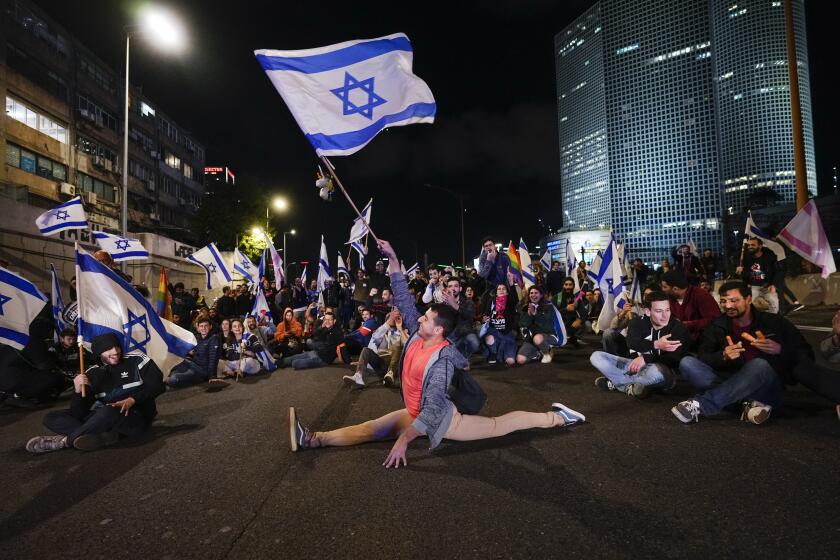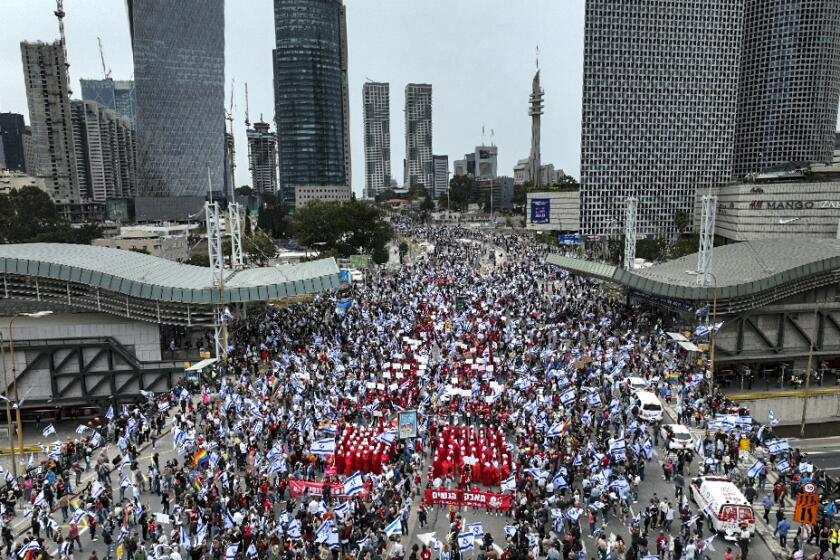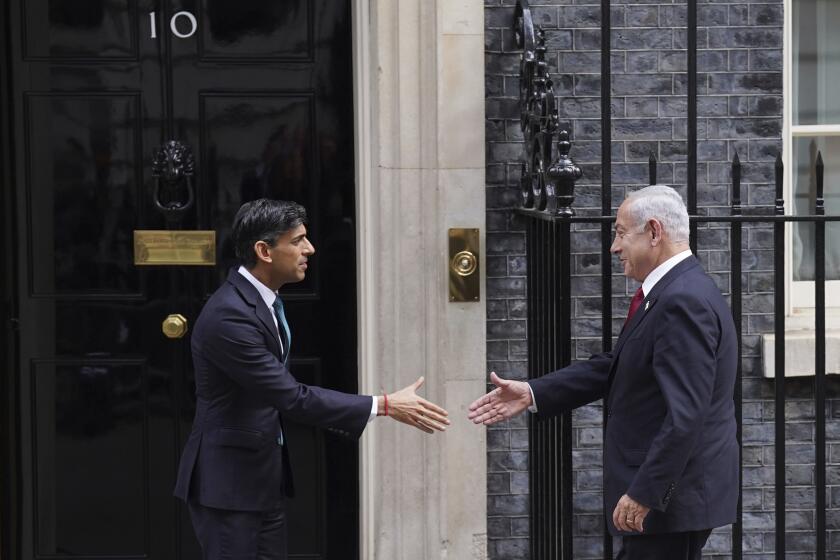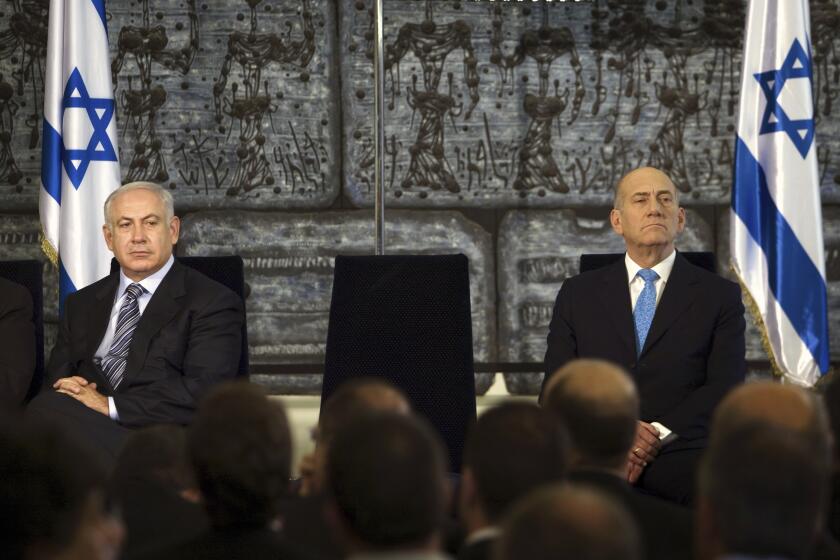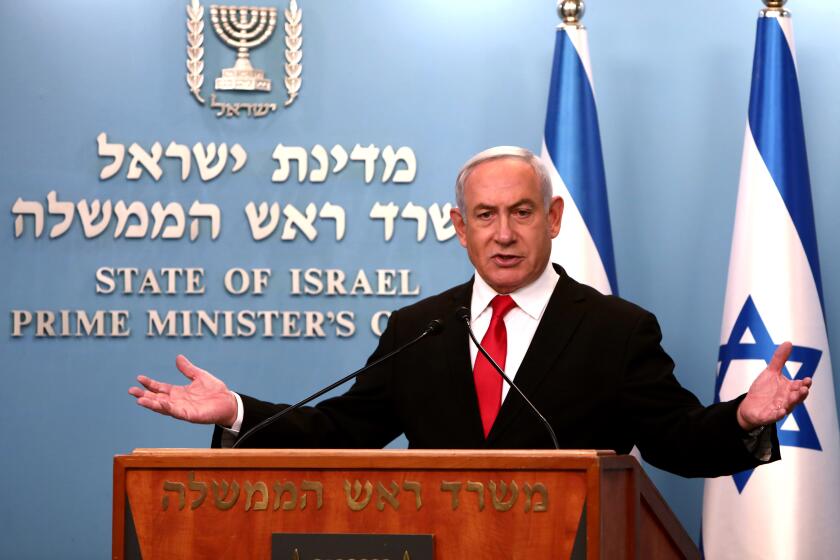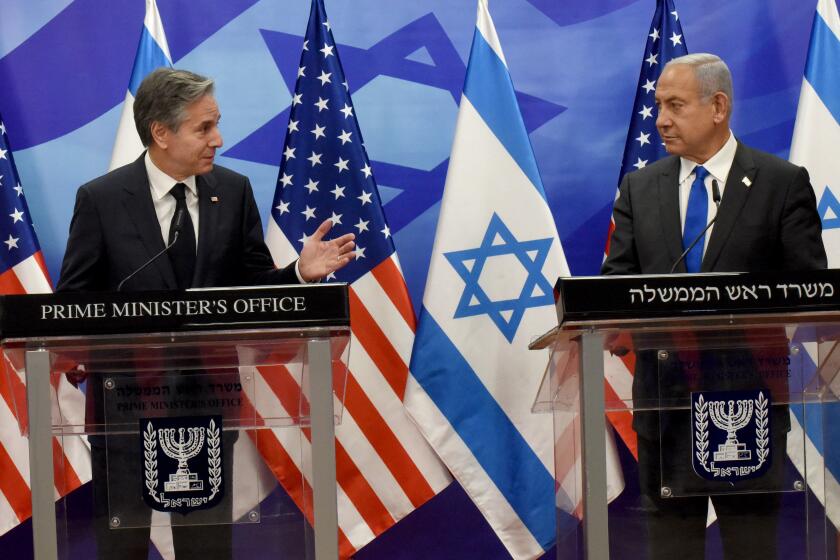Major workers’ strike hits Israel as protests rage against judicial overhaul
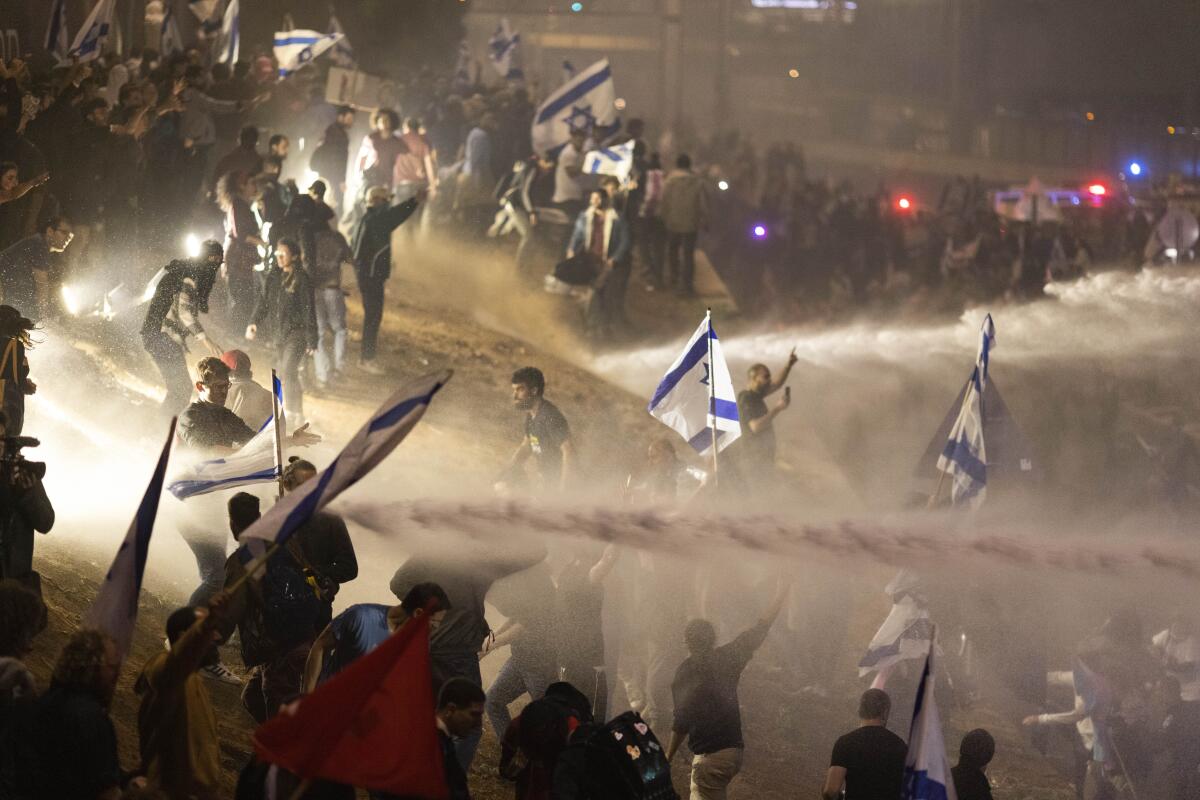
- Share via
JERUSALEM — Tens of thousands of Israelis demonstrated outside parliament and workers launched a nationwide strike on Monday, as a surging mass protest movement threatened to paralyze the economy in its efforts to halt Prime Minister Benjamin Netanyahu’s plan to overhaul the judiciary.
Departing flights from the country’s main international airport were grounded, diplomats walked off the job at foreign missions, large mall chains and universities shut their doors, and Israel’s largest trade union called for its 800,000 members — in health, transit, banking and other fields — to stop work. Local governments were expected to close the preschools they run and cut other services, and the main doctors union announced that its members would also walk off the job.
The growing resistance to Netanyahu’s plan came hours after tens of thousands of people burst onto the streets around the country in a spontaneous show of anger at his decision to fire Defense Minister Yoav Gallant after Gallant called for a pause to the judicial overhaul. Chanting, “The country is on fire,” demonstrators lit bonfires on Tel Aviv’s main highway, closing the artery and many others throughout the country for hours.
Thousands of protesters gathered Monday outside the Knesset, Israel’s parliament, turning the streets surrounding the building and the Supreme Court into a roiling sea of blue-and-white Israeli flags dotted with rainbow Pride banners. Large demonstrations in Tel Aviv, Haifa and other Israeli cities drew thousands of people.
Crisis in Israel deepens over the new government’s radical plans, which have alienated and dismayed Israelis and Jewish Americans alike.
“This is the last chance to stop this move into a dictatorship,” said Matityahu Sperber, 68, who joined a stream of people headed to the protest. “I’m here for the fight to the end.”
It was unclear how Netanyahu would respond to the growing pressure. Some members of Netanyahu’s Likud party said they would support the prime minister if he did heed calls to halt the overhaul, and Israeli media, citing unnamed sources, reported that he could indeed pause it.
The overhaul, driven by Netanyahu, who is on trial for corruption, and his allies in Israel’s most right-wing government ever has plunged Israel into one of its worst domestic crises. It has sparked a sustained and intensifying protest movement that has spread to nearly all sectors of society, including its military, where reservists have increasingly come out publicly to say they will not serve a country veering toward autocracy.
Israel’s Palestinian citizens, however, have largely sat out the protests. Many say Israel’s democracy is tarnished by its military rule over the West Bank and the discrimination Palestinians face.
Israel’s parliament has passed the first of several laws proposed as part of a contentious judicial overhaul that has sparked massive public protests.
The turmoil has magnified longstanding and intractable differences over Israel’s character that have riven it since its establishment. The protesters say they are fighting for the very soul of the nation, saying the overhaul will remove Israel’s system of checks and balances and directly challenge its democratic ideals.
The government has labeled them as anarchists out to topple a democratically elected leadership and says the plan will restore balance between the judicial and executive branches by reining in an interventionist court with liberal sympathies.
At the center of the crisis is Netanyahu himself, Israel’s longest-serving leader, and the lengths he may be willing to go to maintain his grip on power, even as he battles the corruption charges of fraud, breach of trust and accepting bribes in three separate affairs. He denies wrongdoing.
On Monday afternoon, Netanyahu issued his first statement since he fired Gallant, urging against violence ahead of a planned counterprotest in Jerusalem organized by ultranationalist supporters of the judicial overhaul.
British Prime Minister Rishi Sunak welcomed Benjamin Netanyahu to London while demonstrators gathered nearby.
The counterprotest was also slated to take place outside parliament. “They won’t steal the election from us,” read a flier for event, organized by the Religious Zionist party.
“I call on all protesters in Jerusalem, right and left, to behave responsibly and not act violently,” Netanyahu wrote on Twitter.
The firing of his defense minister, at a time of heightened security threats in the West Bank and elsewhere, appeared to be a last straw for many, including apparently the Histadrut, the country’s largest trade union umbrella group, which had sat out the months-long protests before the defense minister’s firing.
“Where are we leading our beloved Israel? To the abyss,” Arnon Bar-David, the union group head, said in a rousing speech to applause. “Today we are stopping everyone’s descent toward the abyss.”
A former Israeli prime minister is urging world leaders to shun the current one, Benjamin Netanyahu, over his plan to overhaul the justice system.
On Monday, as the embers of the highway bonfires were being cleared, Israel’s ceremonial president, Isaac Herzog, urged Netanyahu to immediately halt the overhaul, calling on the government to put aside political considerations for the sake of the nation.
“The entire nation is rapt with deep worry. Our security, economy, society — all are under threat,” he said. “Wake up now!”
Opposition leader Yair Lapid said the crisis was driving Israel to the brink.
“We’ve never been closer to falling apart. Our national security is at risk, our economy is crumbling, our foreign relations are at their lowest point ever, we don’t know what to say to our children about their future in this country,” Lapid said. “We have been taken hostage by a bunch of extremists with no brakes and no boundaries.”
The collapse of the two-state solution and the threat to democracy from a new governing coalition have made Israel unrecognizable now.
It was unclear whether the threats posed by the strikes to Israel’s economy, which is already on shaky ground, would prompt Netanyahu to halt the overhaul. Israeli media reported that a lawyer representing Netanyahu in his corruption trial threatened to quit if the overhaul was not halted.
The developments were being watched in Washington, which is closely allied with Israel yet has been uneasy with Netanyahu and the far-right elements of his government. The U.S. is “deeply concerned” by the developments in Israel, “which further underscore the urgent need for compromise,” National Security Council spokesperson Adrienne Watson said in a statement.
“Democratic values have always been, and must remain, a hallmark of the U.S.-Israel relationship,” Watson said.
Netanyahu had reportedly spent the night in consultations and was set to speak later Monday, but later delayed his speech. Some members of Netanyahu’s ruling Likud party said they would support him if he did heed calls to halt the overhaul.
Start your day right
Sign up for Essential California for the L.A. Times biggest news, features and recommendations in your inbox six days a week.
You may occasionally receive promotional content from the Los Angeles Times.
The architect of the plan, Justice Minister Yariv Levin, a popular party member, was long a holdout, vowing to resign if the overhaul was suspended. But on Monday, he said he would respect the prime minister’s decision should he halt the legislation.
Still, Netanyahu’s hard-line allies pressed him to continue with the changes. “We must not halt the reform in the judicial system and we must not give in to anarchy,” National Security Minister Itamar Ben-Gvir said.
Netanyahu’s dismissal of Gallant, the defense minister, had appeared to signal that he and his allies would press ahead. Gallant was the first senior member of Likud to speak out against it, saying the deep divisions were threatening to weaken the military.
And Netanyahu’s government forged ahead with a centerpiece of the overhaul — a proposal to give the governing coalition the final say over all judicial appointments. A parliamentary committee approved the legislation Monday for a final vote, which could come this week.
The U.S. is so far empty-handed in dealing with Israel’s radical government and dysfunctional Palestinian leadership.
The government also seeks to pass laws that would would grant the Knesset the authority to overturn Supreme Court decisions and limit judicial review of laws.
Netanyahu returned to power late last year after a protracted political crisis that sent Israelis to the polls five times in less than four years. The elections were all a referendum on Netanyahu’s fitness to serve while on trial for corruption.
More to Read
Sign up for Essential California
The most important California stories and recommendations in your inbox every morning.
You may occasionally receive promotional content from the Los Angeles Times.
